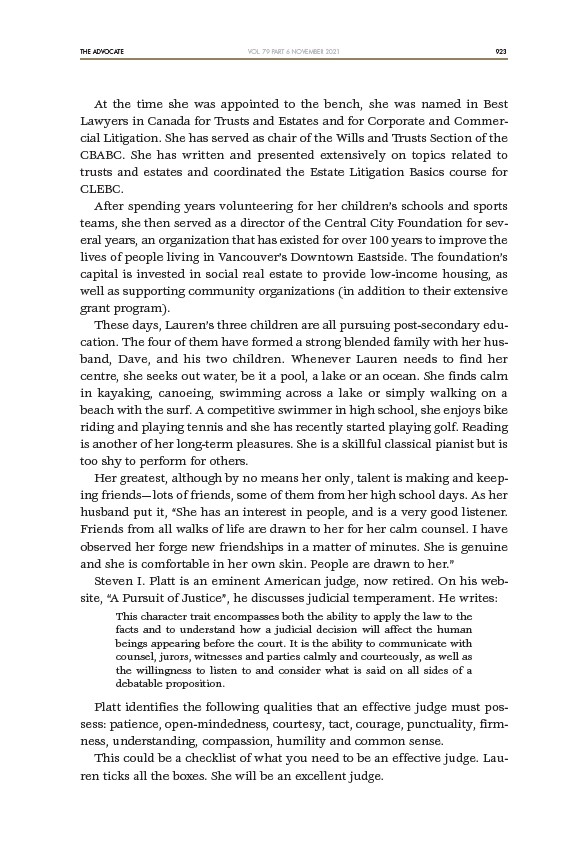
THE ADVOCATE 923
VOL. 79 PART 6 NOVEMBER 2021
At the time she was appointed to the bench, she was named in Best
Lawyers in Canada for Trusts and Estates and for Corporate and Commercial
Litigation. She has served as chair of the Wills and Trusts Section of the
CBABC. She has written and presented extensively on topics related to
trusts and estates and coordinated the Estate Litigation Basics course for
CLEBC.
After spending years volunteering for her children’s schools and sports
teams, she then served as a director of the Central City Foundation for several
years, an organization that has existed for over 100 years to improve the
lives of people living in Vancouver’s Downtown Eastside. The foundation’s
capital is invested in social real estate to provide low-income housing, as
well as supporting community organizations (in addition to their extensive
grant program).
These days, Lauren’s three children are all pursuing post-secondary education.
The four of them have formed a strong blended family with her husband,
Dave, and his two children. Whenever Lauren needs to find her
centre, she seeks out water, be it a pool, a lake or an ocean. She finds calm
in kayaking, canoeing, swimming across a lake or simply walking on a
beach with the surf. A competitive swimmer in high school, she enjoys bike
riding and playing tennis and she has recently started playing golf. Reading
is another of her long-term pleasures. She is a skillful classical pianist but is
too shy to perform for others.
Her greatest, although by no means her only, talent is making and keeping
friends—lots of friends, some of them from her high school days. As her
husband put it, “She has an interest in people, and is a very good listener.
Friends from all walks of life are drawn to her for her calm counsel. I have
observed her forge new friendships in a matter of minutes. She is genuine
and she is comfortable in her own skin. People are drawn to her.”
Steven I. Platt is an eminent American judge, now retired. On his website,
“A Pursuit of Justice”, he discusses judicial temperament. He writes:
This character trait encompasses both the ability to apply the law to the
facts and to understand how a judicial decision will affect the human
beings appearing before the court. It is the ability to communicate with
counsel, jurors, witnesses and parties calmly and courteously, as well as
the willingness to listen to and consider what is said on all sides of a
debatable proposition.
Platt identifies the following qualities that an effective judge must possess:
patience, open-mindedness, courtesy, tact, courage, punctuality, firmness,
understanding, compassion, humility and common sense.
This could be a checklist of what you need to be an effective judge. Lauren
ticks all the boxes. She will be an excellent judge.